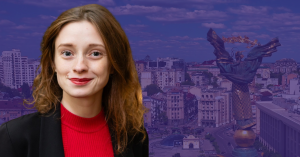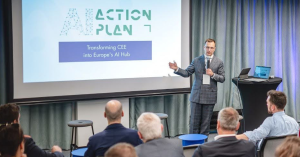Are you ready for the future? A future where calculation time drops from days to seconds, and information is processed in an entirely different way. A future where quantum computing, once a theoretical model for computing based on quantum phenomena, becomes a widespread technological reality and a commercial opportunity.
Unlike classical computers that use bits (0s and 1s) to process information, quantum computers use quantum bits or qubits, which can exist in multiple states simultaneously due to superposition. This allows quantum computers to handle vast amounts of data and perform computations in parallel.
As of now, innovators around the world are exploring various applications for these powerful machines. Quantum technology startups are multiplying and investors are taking notice:
“What transistors did for the rapid advancement of electronic devices, quantum can do on a scale we can’t fully grasp. With quantum, we’re on the cusp of tackling colossal challenges and playing in the same computational league as Mother Nature herself. Quantum computing holds the potential to revolutionize drug development, craft materials that don’t yet have names, and conduct endless simulations without the constraints of reality. It’s poised to rewrite the rules of “learning by doing,” from engineering new proteins to offering a Black Mirror-esque glimpse into the world of online dating,” says Katerina Syslova, from Tensor Ventures, a Czech deep tech-focused fund investing in AI, IoT, blockchain, biotech, and quantum computing across the CEE and UK
Central and Eastern Europe, a bedrock to exceptional tech talent, is no stranger to quantum technology research and development, through its academic institutions, participation in European projects, and a sprouting startup scene.
Quantum technologies in the eyes of investors
Zooming back to Europe, VC investment in quantum tech startups concentrates on four main areas, according to The European Deep Tech Report 2023: quantum computers and processors ($362M), quantum cryptography ($156M), quantum computing software ($98M), and quantum chemistry and AI for chemical/biotech.
“While the realization of quantum computing hasn’t unfolded as swiftly as many anticipated, its adoption is undeniably making steady progress. Beyond companies pushing the boundaries of bare-metal hardware innovation, there’s a notable surge in the quantum software realm. This includes not only software designed for quantum computers but also quantum-inspired algorithms that deliver remarkable results when run on conventional infrastructure,” we are told by Enis Hulli, General Partner at 500 Emerging Europe, a venture capital fund investing in the region.
To experiment with quantum technology and achieve a minimum viable product requires substantial budgets. With budgets primarily allocated to testing purposes, companies are also limited in their ability to grow and scale.
“Nevertheless, as the technology matures and demonstrates its worth, unlocking additional capital and larger budgets will become more attainable, similar to the growth trajectory observed in the field of AI,” Enis Hulli believes.
How CEE participates in the quantum computing revolution
“Central and Eastern Europe is experiencing a notable upswing in interest and activity in the field of quantum technologies,” says Hulli, further pointing to the participation of academic institutions and research centers in countries like Poland and Hungary in quantum research. Such projects in turn contribute to the growth of quantum knowledge and expertise within the region.
Hungary, for instance, has established a National Quantum Technology Programme (HunQuTech) to connect the country to the developing European quantum internet. Hungary is also the sole country from the region participating in the OpenSuperQplus European project, through the Faculty of Natural Sciences and the Wigner Research Centre for Physics at the Budapest University of Technology and Economics. The project aims to develop a 1000-qubit quantum computer.
It shouldn’t be a surprise given CEE’s access to a robust talent pool in mathematics and computer science, whose skills and expertise can be harnessed to drive innovation and advancement in quantum technologies.
A quantum technology startup scene is also emerging. As of October 2023, we tracked 18 Central and Eastern European quantum technology startups. Poland, in particular, sits among the countries with the highest number of startups working on quantum technologies (6 counted in the mapping below), behind only Switzerland, Spain, Netherlands, France, Germany, and the UK.
“CEE innovators excel in one particular arena – identifying technology gaps and challenges and then crafting tailor-made solutions. This may as well be the opportunity that CEE startups are uniquely poised to seize,” observes Katerina Syslova from Tensor Ventures, who has invested in three quantum startups thus far, including Poland-based BeIT.
For investors, tapping into the opportunities presented by one of the most complex technologies out there is nothing short of a challenge.
“We were smart enough to know we weren’t smart enough. So we partnered up with Michal Krelina, one of the best quantum experts there is. He is our guide and Vergiliuls in the landscape of technical due diligence. In our portfolio, we’re constructing interconnected stacks, and quantum is no exception,” adds Katerina Syslova from Tensor Ventures.
All that said, building a comprehensive quantum ecosystem demands time, collaboration, and substantial funding.
“However, it’s important to acknowledge that while CEE is making strides in quantum research and talent development, challenges remain in terms of securing the necessary infrastructure and funding, as well as competing on a global scale with quantum powerhouses like the United States, Canada, and China. To position itself effectively in the global quantum ecosystem, CEE must continue to foster academic and research collaborations, attract investment, and strengthen its overall quantum infrastructure,” says Hulli.
18 quantum technology startups from CEE
Atom Quantum Labs
Location: Ljubljana, Slovenia
Founders: Marjan Beltram, Peter Jeglič
About: The company is designing cold neutral atoms QCs with a completely new and patented approach to preparing qubit arrays.
Stage & Funding: N/A
BEIT
Location: Krakow, Poland
Founders: Wojtek Burkot, Paulina Mazurek, Witek Jarnicki
About: BEIT is a quantum computing software R&D company developing novel quantum algorithms and their implementations with the aim of pushing the boundary of what is possible on quantum hardware.
Stage & Funding: Seed, $4.1M
Entangle Llc
Location: Riga, Latvia
Founders: Girts Kronbergs, Maris Kronbergs, Girts Valdis Kristovskis
About: Entangle offers quantum-secure encryption for connecting mission-critical infrastructure and industrial IoT over public mobile networks.
Stage & Funding: Bootstrapped
Lightmass Dynamics
Location: Zvodno, Slovenia
Founders: Andraz Bole, Nejc Lesek
About: Lightmass Dynamics provides Quantum Neural Models based-solution for simulation and visualization. The company offers an application framework that can be integrated into any existing physics or rendering software for real-time physics simulation and visualization.
Stage & Funding: Seed, $120,000
Nanoxo
Location: Warsaw, Poland
Founders: Janusz Lewiński, Sebastian Gawlowski
About: Nanoxo is a chemical company designing and manufacturing various functional materials, including quantum dots.
Stage & Funding: Seed, $253,000
OPENQBIT
Location: Tallinn, Estonia
Founders: Guillermo Vidal
About: OpenQbit stands for the development of hardware and software easy to use with quantum technology. They provide anyone with the tools necessary to create devices that use quantum technology, machine learning, and neural networks.
Stage & Funding: N/A
PiDust
Location: Patras, Archaia, Greece
Founders: Vasilis Armaos, Paraskevas Deligiannis, and Dimitris Badounas
About: The startup’s intention is ‘to simulate drugs, chemicals, materials, and other quantum systems’ by utilizing quantum computing hardware that already exists. The team at PiDust is made up of quantum computing experts, physicists, software developers, and chemists.
Stage & Funding: N/A
Qaisec
Location: Bankya, Bulgaria
Founders: Boris Grozdanoff, Zdravko Popov, Svetoslav Sotirov
About: QAISEC foresees a future where AI technology serves humanity and does not endanger it. They believe that where human-made crypto algorithms fail physics never does. They are using quantum encryption solutions for finance, industry, state, entertainment, healthcare, critical infrastructure, and communications.
Stage & Funding: N/A
QNA Technology
Location: Wroclaw, Poland
Founders: Artur Podhorodecki
About: They develop blue-light emitting, heavy metal-free quantum dots for advanced technology markets, and quantum dot-based inks, for printable optoelectronics.
Stage & Funding: early VC, $5.8M
Quantum.Phi
Location: Prague, Czech Republic
Founders: Michal Krelina
About: Quantum.Phi provides consulting, analytics, and research services in quantum technologies (including quantum computing and simulation, quantum network and communication, quantum imaging, and quantum measurement). It specializes in applications for the space, security, and defense industry.
Stage & Funding: N/A
Quantum Flytrap
Location: Warsaw, Poland
Founders: Piotr Migdał, Ph.D., Klem Jankiewicz
About: The company develops a no-code integrated development environment (IDE) for quantum computers – to design, debug, unit-test, and deploy quantum algorithms for business.
Stage & Funding: Seed, $260,000
Quantum Neural Technologies (QNT)
Location: Athens, Greece
Founders: Dr. Aggelos Tiskas, Dr. Takis Psarogiannakopoulos
About: The company’s High-Performance Quantum Simulator (HPQS) is designed to specialize in Variational Quantum Algorithms (VQAs) and Machine Learning (ML) tasks. This will enable the automation of high-level, abstract quantum circuit generation and optimize it for efficient resource usage.
Stage & Funding: N/A
Quarks Interactive
Location: Miercurea-Ciuc, Romania
Founders: Laurențiu Niță
About: Quarks Interactive is the startup that developed Quantum Odyssey, the first game where you can learn the concepts of quantum computing. The startup also works with big IT companies, such as IBM, to create software that can power these unique computers.
Stage & Funding: Seed, €230,000
Quantastica
Location: Tallinn, Estonia
Founders: Petar Korponaić
About: Quantastica builds software tools and solutions for hybrid quantum-classical computing.
Stage & Funding: $220,000
ResQuant
Location: Łódź, Poland
Founders: Tomasz Szcześniak, Michal Andrzejczak,
About: They are building a cryptography accelerator through which any electronic device can be protected against quantum computer attacks. They use post-quantum standards recommended by the National Institute of Standards and Technology (NIST) for secure end-to-end encryption. One of the main features of the solution is crypto agility, enabling a wide area of application.
Stage & Funding: Seed, €450,000
STEMIAC
Location: Zagreb, Croatia
Founders: Hrvoje Kukina
About: A Quantum AI startup working on quantum-enhanced machine learning (mostly deep reinforcement learning).
Stage & Funding: N/A
TechNovator
Location: Kepno, Wielkopolskie, Poland
Founders: Arkadii Romanenko, Igor Lykvovyi, Leszek Sawicki, Ruslana Dovzhyk
About: TechNovator provides wireless energy transfer through energy quantization.
Stage & Funding: Grant, $660,000
Transilvania Quantum
Location: Cluj-Napoca, Romania
Founders: Radu Marginean
About: A startup working on creating software for quantum computing and helping clients get ready for the upcoming quantum revolution. Recently, they have started an R&D program on hardware applications for quantum communications.
Stage & Funding: N/A
Quantum technology R&D projects in CEE
The Romanian National Quantum Communication Infrastructure (RoNaQCI) is a project that will develop a quantum communications infrastructure in Romania, coordinated by POLITEHNICA University of Bucharest together with other 29 partners. The project is supported by a 10 million euro grant from the Digital Europe Programme – EU Secure Quantum Communication Infrastructure. The goal is to increase the security and efficiency of communications.
“The Institute of Quantum Research and Quantum Technology” in Demokritos, Greece, aims to produce high-level competitive cutting-edge research in Quantum Computing, Quantum science, and technologies of related phenomena, following the standards of leading centers abroad. The main objective of the Institute is to conduct research on quantum phenomena and quantum computing in industry applications such as energy, communications, shipping, pharmaceuticals, biotechnology, and economics.
The Petascale Supercomputer-Bulgaria Consortium, with leading partner Sofia Tech Park and the Canadian high-tech company InifinityQ, signed a memorandum of cooperation in the field of quantum technologies. A quantum computing module based on InifinityQ technology will be installed on the Bulgarian petascale supercomputer Discoverer, at the Sofia Tech Park. The aim is to provide access to Bulgarian and European scientists to the Quantum module in order to perform scientific calculations in areas such as molecular dynamics, physics, engineering problems, and others.
Quantum Cosmos Lab, a scientific group at the Institute of Physics of the Jagiellonian University in Krakow, Poland, focuses their research on quantum gravity and quantum cosmology, nonlinear phase space field theories, the phenomenology of quantum gravity, quantum gravity on quantum computers, and gravity/entanglement duality, as well as quantum space technologies.
The European High-Performance Computing Joint Undertaking, based in Luxembourg, selected six countries, including the Czech Republic and Poland, to build a network of quantum computers in the European Union. Creotech Instruments, a leading Polish provider of specialized electronics for the quantum market, is among the organizations selected to create such a computer in Poland.
The IT4Innovations National Supercomputing Centre will host the first Czech quantum computer, to be available to the European research community starting in 2024, operated by the LUMI-Q consortium.
The Slovak National Center for Quantum Technologies is a non-profit association that serves as the central coordination and support entity for all activities related to research and education in quantum technologies in Slovakia, including developing quantum technology systems and networks.
The Hungarian National Quantum Technology Programme (HunQuTech) has been established to connect Hungary to the developing European quantum internet, help the country’s researchers compete with the rest of the continent in quantum technology, and improve prospects for the training of quantum technology engineers and researchers within the country. HunQuTech has a strong focus on quantum communication and cryptography.
The OpenSuperQplus project unites 28 European research partners from 10 countries aiming to develop a 1000 qubit quantum computer. Among the partners, are the Faculty of Natural Sciences and the Wigner Research Centre for Physics at the Budapest University of Technology and Economics (BME) from Hungary.








